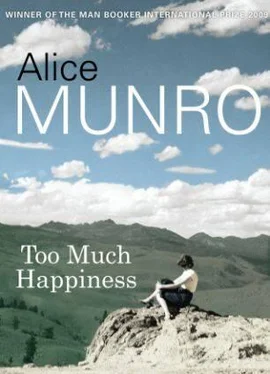Beside the phone was one of their many bookcases. This one held mostly old books, books that had not been opened for years. There was The Proud Tower . Albert Speer. Rich’s books.
A Celebration of Familiar Fruits and Vegetables: Hearty and Elegant Dishes and Fresh Surprises , assembled, tested, and created by Bett Underhill.
Once they had got the kitchen finished Nita had made the mistake for a while of trying to cook like Bett. For a rather short while, because it turned out that Rich did not want to be reminded of all that fuss, and she herself had not enough patience for so much chopping and simmering. But she had learned a few things that surprised her. Such as the poisonous aspects of certain familiar and generally benign plants.
She should write to Bett.
Dear Bett, Rich is dead and I have saved my life by becoming you.
What does Bett care that her life was saved? There’s only one person really worth telling.
Rich. Rich. Now she knows what it is to really miss him. Like the air sucked out of the sky.
She should walk down to the village. There was a police office in the back of the Township Hall.
She should get a cell phone.
She was so shaken, so deeply tired, she could hardly stir a foot. She had first of all to rest.
· · ·
She was wakened by a knocking on her still unlocked door. It was a policeman, not the one from the village but one of the provincial traffic police. He asked if she knew where her car was.
She looked at the patch of gravel where it had been parked.
“It’s gone,” she said. “That’s where it was.”
“You didn’t know it was stolen? When did you last look out and see it?”
“It must have been last night.”
“The keys were left in it?”
“I suppose they must have been.”
“I have to tell you it’s been in a bad accident. A one-car accident just this side of Wallenstein. The driver rolled it down into the culvert and totalled it. And that’s not all. He’s wanted for a triple murder. That’s the latest we heard, anyway. Murder in Mitchellston. You were lucky you didn’t run into him.”
“Was he hurt?”
“Killed. Instantly. Serves him right.”
There followed a kindly stern lecture. Leaving keys in the car. Woman living alone. These days you never know.
Never know.
I am convinced that my father looked at me, stared at me, saw me, only once. After that, he could take for granted what was there.
In those days they didn’t let fathers into the glare of the theater where babies were born, or into the room where the women about to give birth were stifling their cries or suffering aloud. Fathers laid eyes on the mothers only after they were cleaned up and conscious and tucked up under pastel blankets in the ward, or in the semi-private or private rooms. My mother had a private room, as became her status in the town, and just as well, actually, seeing the way things turned out.
I don’t know whether it was before or after his first look at my mother that my father stood outside the window of the nursery for his first glimpse of me. I rather think it was after, and that when she heard his steps outside her door and crossing her room, she heard the anger in them but did not know yet what had caused it. After all, she had borne him a son, which was presumably what all men wanted.
I know what he said. Or what she told me he said.
“What a chunk of chopped liver.”
Then, “You don’t need to think you’re going to bring that into the house.”
One side of my face was-is-normal. And my entire body was normal from toes to shoulders. Twenty-one inches was my length, eight pounds five ounces my weight. A strapping male infant, fair skinned though probably still red from my unremarkable recent journey.
My birthmark not red, but purple. Dark in my infancy and early childhood, fading somewhat as I got older, but never fading to a state of inconsequence, never ceasing to be the first thing you notice about me, head-on, or are shocked to see if you have come at me from the left, or clean, side. It looks as if someone has dumped grape juice or paint on me, a big serious splash that does not turn to driblets till it reaches my neck. Though it does skirt my nose pretty well, after dousing one eyelid.
“It makes the white of that eye look so lovely and clear” was one of the idiotic though pardonable things my mother would say, in the hope of making me admire myself. And an odd thing happened. Sheltered as I was, I almost believed her.
Of course my father could not do anything to prevent my coming home. And of course my presence, my existence, made a monstrous rift between my father and mother. Though it is hard for me to believe there had not always been some rift, some incomprehension at least, or chilly disappointment.
My father was the son of an uneducated man who owned a tannery and then a glove factory. Prosperity was ebbing as the twentieth century progressed, but the big house was still there, the cook and the gardener. My father went to college, joined a fraternity, had what was referred to as a high old time, entered the insurance business when the glove factory went under. He was as popular around our town as he had been at college. A good golfer, an excellent sailor. (I have not mentioned that we lived on the cliffs above Lake Huron, in the Victorian house my grandfather had built facing the sunset.)
At home my father’s most vivid quality was a capacity for hating and despising. In fact those two verbs often went together. He hated and despised certain foods, makes of automobile, music, manners of speech and modes of dress, radio comedians and later on television personalities, as well as the usual assortment of races and classes it was customary to hate and despise (though perhaps not so thoroughly as he did) in his day. In fact most of his opinions would have found no argument outside our house, in our town, with his sailing companions, or his old fraternity brothers. It was his vehemence, I think, that brought out an uneasiness that could also amount to admiration.
Calls a spade a spade. That was what was said of him.
Of course a production like myself was an insult he had to face every time he opened his own door. He took breakfast alone and did not come home for lunch. My mother ate those meals with me and part of her dinner also, the rest of dinner with him. Then I think there was some sort of row about this, and she sat through my meal with me but ate with him.
It can be seen that I could not contribute to a comfortable marriage.
But how had they ever come together? She had not gone to college, she had to borrow money to attend a school where teachers were trained in her day. She was frightened of sailing, clumsy at golf, and if she was beautiful, as some people have told me (it is hard to make that judgment of your own mother), her looks cannot have been of the kind my father admired. He spoke of certain women as stunners, or, later in his life, as dolls. My mother did not wear lipstick, her brassieres were unassertive, her hair was done in a tight crown of braids that emphasized her wide white forehead. Her clothes lagged behind the style, being somewhat shapeless and regal-she was the sort of woman you could imagine wearing a rope of fine pearls, though I don’t think she ever did.
What I seem to be saying, I guess, is that I may have been a pretext, a blessing even, in that I furnished them with a ready-made quarrel, an insoluble problem which threw them back on their natural differences where they may in fact have been more comfortable. In all my years in the town, I encountered no one who was divorced, and so it may be taken for granted that there were other couples living separate lives in one house, other men and women who had accepted the fact that there were differences never to be mended, a word or an act never to be forgiven, a barrier never to be washed away.
Читать дальше












